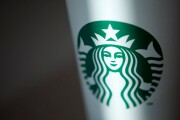A group of unions filed a complaint against Starbucks with the U.S. Securities and Exchange Commission, asking the agency to investigate how the coffee chain accounts for unused money left on customers' stored-value cards and accounts.
Starbucks claimed $181 million in revenue from money that wasn't spent on gift cards and loyalty accounts in fiscal 2021, an uptick from about $145 million the previous year. While that's just a small percentage of profit and revenue, the proportion of income coming from unused company credit has grown in recent years, according to the complaint that was filed Wednesday by the Strategic Organizing Center.
The group, known as the SOC, is made up of unions including the parent of Workers United, which is driving a unionization campaign at Starbucks's U.S. locations. Hundreds of stores have voted in favor of forming unions, although the pace of unionization petitions has slowed in recent months.
The SOC argues that Starbucks's disclosures around unredeemed credit, known in the industry as breakage, are inadequate for investors. It adds that the Seattle-based company hasn't explained how COVID-19 and store closures may have affected its calculations, given diners' ability to spend gift credits was likely impaired by pandemic-related store closures.

Starbucks got about 43% of its revenue in fiscal 2021 from stored-value programs, which range from gift cards to credits in the company's loyalty app. A small part of that is unredeemed rewards. The $181 million represented less than 1% of sales in 2021 and 4.3% of net income before factoring in taxes.
"Starbucks discloses so little about breakage that this significant, and likely material, aspect of Starbucks' financial health is a virtual black box for investors," said Michael Zucker, the SOC's executive director. He argued the use of unredeemed credit "could be masking a failure to meet earnings expectations, or even allowing the company to double-count revenue."
A spokesman for Starbucks declined to comment on breakage beyond the company's annual report.
Michael Halen, a Bloomberg Intelligence restaurant analyst, said Starbucks gives less disclosure than some peers on how it calculates and processes unspent credit, "which is kind of surprising." The credit represents "a very large percent of their transactions and total U.S. sales," he added.
In the U.S. and many other markets, the stored-value cards don't expire. Starbucks says that based on historical redemption rates, a portion of the funds aren't expected to be redeemed and "will be recognized as breakage over time in proportion to stored-value card redemptions." In its most recent annual filing, Starbucks says that those redemption patterns vary by market.
Starbucks credit is issued via gift cards, which are sold at retailers and at its own cafes. It's also available on rewards accounts, which can be replenished by purchases online or on the mobile app. The credits can be used at all company-operated locations and most licensed stores across North America, China, Japan and many other international markets, according to company filings.
Other restaurants also recognize unspent gift-card money, or breakage, as revenue over time and offer some details as to how they calculate that. Texas Roadhouse, for example, says that based on historical data, about 4.5% of its gift cards sold won't be spent.
So far, about 250 Starbucks locations have voted to unionize, a small portion of its 9,000 company-run U.S. stores. The dispute with activists has become increasingly bitter, and regional National Labor Relations Board officials have issued dozens of complaints against the company.
Starbucks has repeatedly said it follows U.S. labor rules. The chain has sought to blunt the union drive in part by raising wages, adding new equipment and offering training that aims to make workers' jobs easier.
—With assistance from Josh Eidelson.






